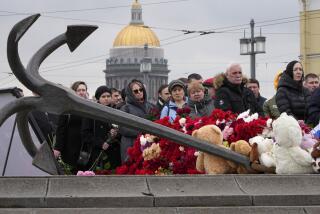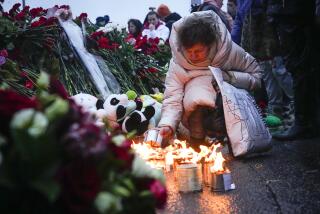Yuja Wang and the Russian National Orchestra perform in Northridge
The Russian pianist-conductor Mikhail Pletnev once said that “intensity” was the most basic characteristic of the Russian sound, and that quality was fully on display at the Valley Performing Arts Center in Northridge on Friday night as he led the Russian National Orchestra in a program of works by Shostakovich, Tchaikovsky and Stravinsky.
The sold-out concert kicked off the orchestra’s 16-city 25th anniversary tour, with upcoming stops in Palm Desert and at the Segerstrom Center for the Arts in Costa Mesa.
SIGN UP for the free Classic Hollywood newsletter >>
By his own reckoning, Pletnev, who founded the orchestra in 1990 and remains its music and artistic director, has not performed in Southern California in nearly a decade. Once regarded as a cool, undemonstrative conductor, Pletnev’s podium manner was involved and involving. The orchestra played brilliantly from the concert’s rousing opener, Shostakovich’s “Festive Overture.”
Intense focus also marked soloist Yuja Wang’s blazing account of the concert’s centerpiece, Tchaikovsky’s Piano Concerto No. 2, proving you don’t have to be Russian to play like one. She displayed a Horowitz-like bravura in the concerto’s opening movement, dispatching long chordal passages in the big cadenza (one of three) with breathtaking accuracy and dexterity.
Such economy of motion at the keyboard was fascinating to watch. Wang achieved maximum effect with seemingly minimal effort. If she were a tennis player, she would be Roger Federer.
Though not as popular as the First Concerto, Tchaikovsky’s Second (there’s also a single-movement Third) is just as crowd-pleasing. Pletnev and the orchestra maintained an exciting sense of forward sweep in the concerto’s outer movements, handling some of Tchaikovsky’s characteristic bombast with the right degree of panache.
The score’s soulful central Andante, which has often been subject to cuts, came off as lovely but as odd as ever. The beginning, a duo-concerto that almost forgets about the orchestra altogether, gave the RNO’s concertmaster, Alexey Bruni, and principal cellist, Alexander Gotgelf, a chance to shine. Eventually, Wang joined in, making it a quasi triple concerto.
Wang and the orchestra, playing the full score Pletnev himself performed on his impressive Virgin Classics disc from 1998, brought the work in at a longish 46 minutes, but found enough contrasting lyricism amid the score’s many climaxes and flamboyant passages to keep it afloat.
Amazingly, Wang had enough energy left for an encore: Earl Wild’s arrangement of the “Pas de Quatre” from Tchaikovsky’s “Swan Lake,” delicately rendered.
After intermission, Pletnev summoned colorful intensity from the ensemble in a carefully shaped reading of Stravinsky’s “The Firebird,” contoured to highlight the ensemble’s many virtuosos. Individual sonorities from flute, oboe and horns bloomed. Pletnev and the RNO performed the 1945 version, which benefits from a generous selection of music from the composer’s ballet score perfectly paced for a concert audience.
Though some textural transparency was lost in climaxes, and string tremolos grew coarse in the climactic “Infernal Dance,” the work’s alluring mystery came through in a hypnotic rendition of the penultimate “Berceuse.” Besides, isn’t a certain bravura coarseness also part of the Russian sound?
The orchestra offered two rhythmically incisive encores: Khachaturian’s Waltz from “Masquerade,” and Tchaikovsky’s “Dance of the Buffoons” from “The Snow Maiden.”
Follow The Times’ arts team @culturemonster.
More to Read
The biggest entertainment stories
Get our big stories about Hollywood, film, television, music, arts, culture and more right in your inbox as soon as they publish.
You may occasionally receive promotional content from the Los Angeles Times.






